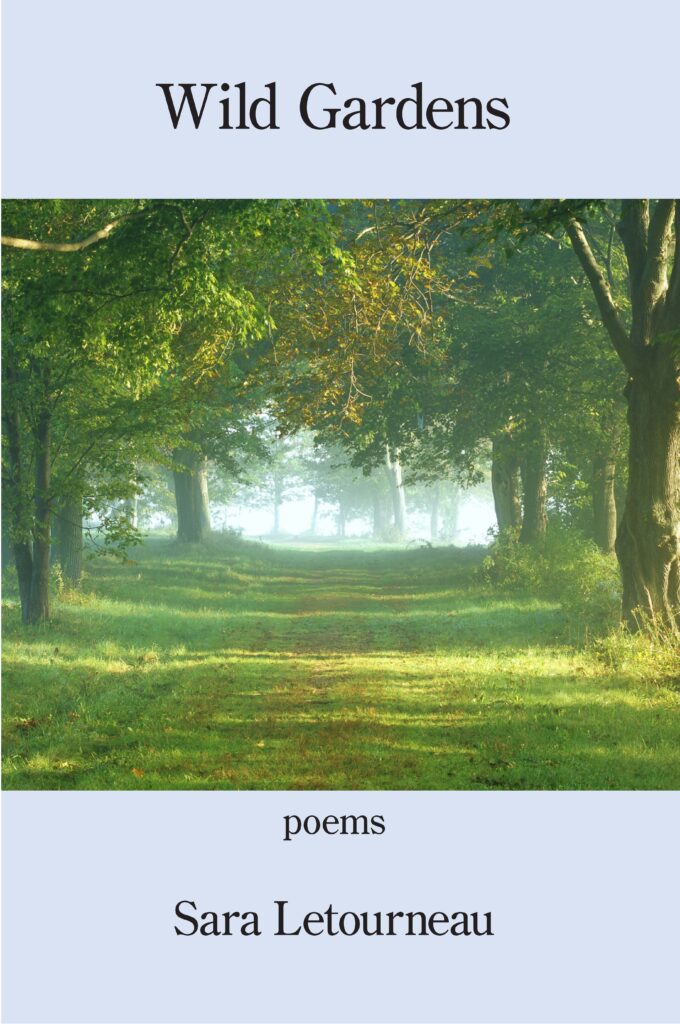Poet Sara Letourneau chats with me today about her debut collection of poems, Wild Gardens.

Bio:
Sara Letourneau’s debut poetry collection, Wild Gardens, is out now through Kelsay Books. She’s also a book editor and writing coach at Heart of the Story Editorial & Coaching Services; the cofounder and cohost of the Pour Me a Poem open mic in Mansfield, Massachusetts; and the co-editor of the Pour Me a Poem anthology. Her poetry has won the 2023 Beals Prize for Poetry and the Blue Institute’s 2020 Words on Water contest. Her new and upcoming work can be found in Amethyst Review, The Arts Fuse, Gyroscope Review, Nixes Mate Review, Remington Review, and Silver Birch Press, and Third Wednesday Magazine, among others. Sara lives in Foxboro, Massachusetts.
What do you enjoy most about writing poems?
I’ve been writing for so long that it feels instinctive now. But when I really think about it, what I enjoy most about writing poems is that it allows me to explore themes and ideas that matter to me in creative, unexpected ways. I also love how poems help me delve deep into micro-moments and reveal details that help the reader feel like they’re inside those moments and vicariously experiencing the emotions that are being conveyed.
Can you give us a little insight into a few of your poems – perhaps a couple of your favorites?
“At World’s End”: Sometime before the COVID-19 pandemic, I visited an art gallery in Chatham, Massachusetts (part of Cape Cod) and saw the exact photograph that’s now part of the cover for Wild Gardens. (The photo was taken by Mike Sleeper: https://mikesleeper.com/.) The gallery owner told me that the picture was of World’s End, and all I could think was, Where is this place?! It’s so beautiful, I want to go there and see this!
Fast-forward to September 2024. My boyfriend and I visited World’s End for my birthday, since it turned out the park is only a 30-minute drive from where I live. We brought a picnic lunch and wandered along the walking paths, and the weather couldn’t have been more perfect. I’m not surprised that a poem came out of this experience; the joy I felt about finally visiting this gorgeous place on an absolutely spectacular day was transcendental.
“No Darkness Here (An Ode to Metal Music)”: Whenever I share this poem at readings, I love seeing people’s reactions to it! I’ve been a music lover for a long time: pop/rock, singer-songwriter, classical, ambient instrumentals—and yes, metal. In fact, for several years I was a CD reviewer for Sonic Cathedral, a webzine covering female-fronted rock and metal bands. And thanks to the albums I reviewed, the bands I interviewed, the concerts I attended, and the friends I made during that time, I learned the negative stereotypes most people think of when it comes to metal music are mostly wrong. (Think “one bad apple spoils the whole barrel.”)
Oddly enough, I wrote the first draft of this poem after attending a workshop at the 2018 Massachusetts Poetry Festival—and the poet running the workshop performed live music as our prompt! I could tell from the style of his guitar riffs that his playing was inspired by rock and metal, and . . . well, as they say, the rest is history.
“Lament of the North Atlantic Right Whale”: Back in 2018, I read about how endangered this species of whale has become. (Not much has changed since then. As of the time I’m writing this, there are about 370 North Atlantic right whales left, and only 70 of those are reproducing females***—and most of their deaths are due to human causes such as boat strikes and entanglements in fishing gear.) So I knew I wanted to write about the losses this species is experiencing, but not from a human perspective. The poem’s speaker is a reproducing female North Atlantic right whale who’s lost her most recent calf, and this allows the poem to be not just conservation-focused but also a piece about a mother’s grief.
***“North Atlantic Right Whale Calving Season 2025,” NOAA Fisheries, accessed December 26, 2024, https://www.fisheries.noaa.gov/national/endangered-species-conservation/north-atlantic-right-whale-calving-season-2025.
What form are you inspired to write in the most? Why?
I write mostly in free verse. Sometimes I feel that poetic forms that rely on structure are a bit restrictive, but every now and then I come across a form that I can’t WAIT to try, like a haibun. (“Peach Pie Ice Cream Haibun” from Wild Gardens is one example.) The poetry forms I like most are ones that direct the poem’s “voice” or tone, like odes and persona poems. And readers will find a few odes and persona poems in Wild Gardens, too!

What type of project are you working on next?
I’ve already got over 20 poems published or accepted for publication for a second poetry collection, and another 20 or so poems written. So my writing goals for 2025 are to write several more poems, fine-tune the best ones, and get several more published (or accepted for publication). That way, sometime in 2026, I may have a second manuscript ready for submission.
I think I have the possible title for Collection #2, but I don’t want to give it away yet. As for how it’ll be different from Wild Gardens? The more recent poems are more mature and show how I’ve grown as a poet. My work is still pretty accessible, but I’m more willing to take risks, dig deep and be vulnerable, and explore new topics while returning to other themes that are still important to me.
When did you first consider yourself a writer / poet?
Part of me wants to say that it began in the last decade, when I was having lunch with my former college advisor (who was an English professor) and said, “Yes! I’m a writer!” But in all truth, it began when I was seven years old, writing stories at the kitchen island. As I got older, I dabbled in other forms of writing, including poetry. But even though I didn’t seriously start writing and submitting poetry until 2013, “writer” has been part of my identity for much, much longer.
How do you research markets for your work, perhaps as some advice for not-yet-published poets?
I used to use Duotrope for researching poetry markets and tracking my submissions and responses. Today, I’m connected with so many poets, presses, and journals that most of my research now comes from social media, recommendations from my network of poets, or reading where my friends and acquaintances are getting their work published. I often know whether a market is a good place for my poetry if I see they’re featuring work with themes or tones that are like-minded with mine, or if I feel lit up after reading some of the poems they’ve published.
What would you say is your interesting writing quirk?
I always write while listening to music. It’s so hard for me to write in silence or when conversations and other sounds are present! So when I work on an individual poem, I’ll put a song on repeat and listen to it over and over. It’s almost as if the song helps me “steep” myself in the poem’s unique mood or atmosphere. In fact, I listened to so many songs while working on the poems in Wild Gardens that I created a playlist using those songs! And the genres range from classical and ambient instrumentals, to pop/rock and acoustic music, to (no surprise!) metal and progressive rock.
As a child, what did you want to be when you grew up?
To be very honest? An author! So in a way, I guess I’ve achieved that dream.
Anything additional you want to share with the readers?
Thank you so much for being here! I hope you enjoyed reading this interview. And if you decide to read Wild Gardens afterward, I hope you love it and share it with other poetry lovers you know.
Links:
Buy page for Wild Gardens | Heart of the Story Editorial & Coaching Services | Facebook | Instagram | LinkedIn
